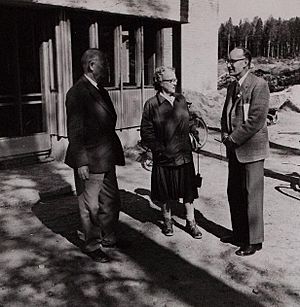William Homan Thorpe facts for kids
William Homan Thorpe (born April 1, 1902 – died April 7, 1986) was a very important British scientist. He was a professor at the University of Cambridge. He studied animals, especially their behavior (this is called ethology) and birds (this is called ornithology). He helped make the study of animal behavior popular in Great Britain.
Contents
Life and Work
William Thorpe grew up in places like Hastings and Weston-super-Mare in England. His father worked with money for the local government and also for a missionary group. His mother was involved in the women's right to vote movement and believed in peace.
He went to school at Mill Hill School and then studied Agriculture at Jesus College, Cambridge in 1921. He became interested in insects after hearing a talk by another scientist.
Early Career with Insects
In 1925, William Thorpe started working on insect pests in the Department of Agriculture. He continued this work for two years in California, USA. He earned his PhD from Cambridge in 1929.
Later, he became a lecturer in Entomology (the study of insects) at Cambridge. During World War II, he studied insects that ate stored food. This was important for making sure people had enough to eat.
Studying Animal Behavior
William Thorpe was very interested in how animals learn. In 1943, he wrote a big review about how insects learn. Then, in 1951, he wrote a similar book about how birds learn.
He paid close attention to the new research on animal behavior by scientists like Konrad Lorenz and Niko Tinbergen. He helped introduce their ideas to people in England. In 1956, he published his own important book called Learning and Instinct in Animals.
In 1950, he became the first director of the Cambridge Ornithological Field Station. This was a special place for studying birds. He became a professor at Cambridge in 1966.
Bird Song Research
When a new machine called a sound spectrograph came out, William Thorpe quickly saw how useful it was. This machine could record sounds and show how their frequencies (how high or low they are) and loudness changed over time.
This made it possible to study bird songs in a very detailed way. He got the first of these machines in the UK. He then led a group of talented scientists who studied bird songs. He also did careful studies on how young animals learn from their parents, a process called imprinting.
Other Interests
William Thorpe was also a strong supporter of protecting nature. He helped save a special wetland area called Wicken Fen from being drained and built on. He also advised a group that was against the noisy Concorde airplane.
He believed that there was a purpose and mind in nature, which was different from some other scientists who thought everything was just random. He wrote a book about this called Purpose in a World of Chance in 1978. He also believed that religious faith and science could work together.
Awards and Recognition
William Thorpe was recognized for his important work. He was elected to the Royal Society in 1951, which is a very high honor for scientists in the UK. He also gave the famous Gifford lectures from 1969 to 1971. From 1955 to 1960, he was the president of the British Ornithologists' Union, a group for people who study birds.
 | James B. Knighten |
 | Azellia White |
 | Willa Brown |


